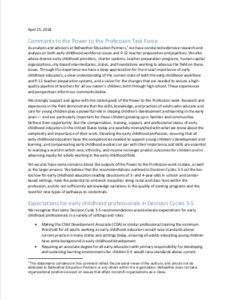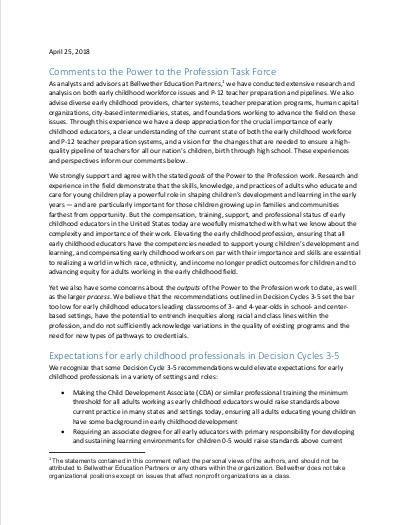Bellwether’s early childhood team regularly publishes research and analysis on the early childhood workforce and advises foundations and other clients seeking to improve early childhood teaching, strengthen the early childhood workforce, and support early childhood educators. In our work we routinely confront the deep disconnect between what research demonstrates about the importance of and skills required for high-quality early childhood teaching and the inconsistent standards, low compensation, and lack of professional prestige accorded to early educators.

Courtesy of Allison Shelley/The Verbatim Agency for American Education: Images of Teachers and Students in Action.
In light of this, we’ve been avidly following the National Association for the Education of Young Children (NAEYC) Power to the Profession process, which seeks to advance the early childhood field by defining a unifying framework for career pathways; knowledge; and competencies, qualifications, standards, and compensation.
This work is being carried out in iterative cycles by a Task Force representing 15 professional associations and organizations related to the early childhood field. In February, the Task Force released draft recommendations for Decision Cycles 3-5, which deal with qualifications requirements for early childhood educators and sources and pathways for acquiring competencies and credentials. The recommendations have sparked lively debate in the field. My overall take, shared with my colleagues Ashley LiBetti and Marnie Kaplan, is that the recommendations would represent progress in setting a baseline of training for early childhood educators in many roles and settings, but could also represent a step backwards in standards for teachers leading publicly funded pre-K classrooms serving 3- and 4-year-olds.
We also believe it’s crucial that any conversation about qualifications for early childhood educators engage seriously with the need to improve quality of early childhood educator preparation programs — as well as the tensions and gaps in knowledge about how best to do so. These conversations also need to provide space for innovative thinking about new models for delivering preparation and training that meet the needs of current and prospective early educators with diverse life and professional experiences and prior education backgrounds.
Marnie, Ashley, and I published our full comments* on these recommendations here:

You can learn what others are saying here or comment yourself by visiting NAEYC’s survey here.
Want to know more from Bellwether? Check out our recent research and reports on the Head Start workforce, what we know about coaching as a strategy to improve early childhood teaching quality, the role of community colleges in early childhood preparation, and what it would take to make equitable access to quality higher education a reality for all pre-K teachers.
*Note: The statements contained in this comment reflect the personal views of the authors, and should not be attributed to Bellwether Education Partners or any others within the organization. Bellwether does not take organizational positions except on issues that affect nonprofit organizations as a class.
